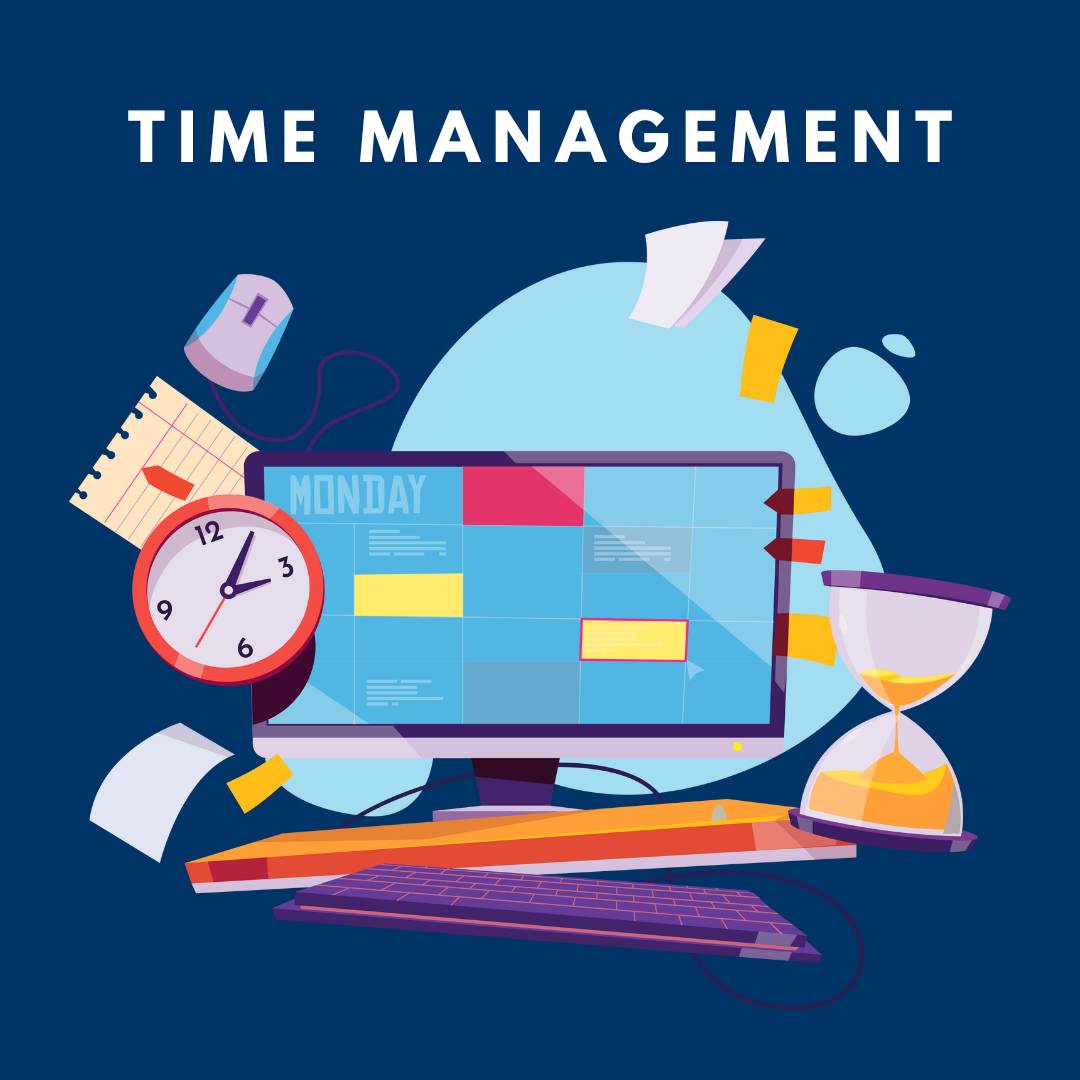Table of Contents
Time management is a critical skill for achieving personal and professional success. With the increasing demands of modern life, managing your time effectively can make the difference between productivity and chaos. This blog will explore proven techniques for better efficiency, helping you master time management and make the most of every day.
Understanding Time Management
Time management involves organizing and planning how to divide your time between different activities. Good time management enables you to work smarter, not harder, ensuring that you accomplish more in less time, even when time is tight and pressures are high.
Benefits of Effective Time Management:
- Increased Productivity: Accomplish more tasks in less time.
- Reduced Stress: Manage deadlines and reduce the pressure of last-minute rushes.
- Improved Quality of Work: Allocate sufficient time to each task, resulting in better outcomes.
- Enhanced Work-Life Balance: Make time for both professional responsibilities and personal activities.
Proven Techniques for Better Efficiency
1. Prioritize Your Tasks
Not all tasks are created equal. Some tasks have a higher impact on your goals and should be given priority.
Techniques for Prioritizing:
- Eisenhower Matrix: Divide tasks into four categories: urgent and important, important but not urgent, urgent but not important, and neither urgent nor important. Focus on the tasks that are important and urgent.
- ABC Method: Label tasks as A (high priority), B (medium priority), and C (low priority). Complete A tasks first before moving on to B and C tasks.
- Pareto Principle (80/20 Rule): Focus on the 20% of tasks that contribute to 80% of your results.
2. Set SMART Goals
Setting SMART goals ensures that your objectives are clear and achievable, providing a roadmap for your tasks.
SMART Goals Framework:
- Specific: Clearly define your goals.
- Measurable: Set criteria for measuring progress.
- Achievable: Ensure your goals are realistic and attainable.
- Relevant: Align goals with your overall objectives.
- Time-bound: Set a deadline for completion.
3. Create a Daily Schedule
A well-structured schedule helps you allocate time effectively and avoid procrastination.
Tips for Creating a Schedule:
- Time Blocking: Allocate specific time blocks for different activities. This minimizes distractions and keeps you focused.
- Use a Planner: Whether digital or paper-based, planners help you organize your day and keep track of tasks.
- Set Realistic Deadlines: Ensure that your schedule is achievable and allows time for breaks and unexpected interruptions.
4. Eliminate Distractions
Distractions can significantly reduce your efficiency. Identifying and eliminating them is crucial for maintaining focus.
Strategies to Eliminate Distractions:
- Identify Common Distractions: Recognize what commonly distracts you, such as social media, phone notifications, or noisy environments.
- Create a Distraction-Free Workspace: Set up a dedicated workspace with minimal distractions. Use noise-cancelling headphones if necessary.
- Set Boundaries: Inform colleagues or family members of your working hours and request not to be disturbed.
5. Practice the Pomodoro Technique
The Pomodoro Technique involves working in short, focused intervals followed by brief breaks, enhancing concentration and productivity.
How to Use the Pomodoro Technique:
- Work for 25 Minutes: Focus on a single task for 25 minutes.
- Take a 5-Minute Break: After 25 minutes of work, take a short break to rest and recharge.
- Repeat: After four Pomodoros, take a longer break (15-30 minutes).
6. Delegate Tasks
Delegating tasks allows you to focus on high-priority activities and leverage the strengths of others.
Tips for Effective Delegation:
- Identify Tasks to Delegate: Determine which tasks can be handled by others.
- Choose the Right Person: Delegate tasks to individuals with the appropriate skills and experience.
- Provide Clear Instructions: Ensure that the person understands the task and your expectations.
7. Use Technology to Your Advantage
Numerous tools and apps are designed to enhance productivity and streamline time management.
Recommended Tools:
- Trello: A project management tool that helps you organize tasks and collaborate with others.
- Todoist: A task management app that allows you to create and prioritize tasks.
- RescueTime: An app that tracks your time usage and provides insights into how you spend your time.
8. Learn to Say No
Taking on too many tasks can lead to burnout and decreased efficiency. Learning to say no is essential for effective time management.
Tips for Saying No:
- Assess Your Capacity: Before committing to a new task, evaluate your current workload.
- Be Polite but Firm: Politely decline tasks that you cannot take on without compromising your priorities.
- Offer Alternatives: If possible, suggest an alternative person or time for the task.
9. Reflect and Adjust
Regularly reflecting on your time management practices and making necessary adjustments ensures continuous improvement.
Steps for Reflection:
- Review Your Progress: Regularly assess your progress towards your goals.
- Identify Improvement Areas: Determine what is working well and what needs adjustment.
- Adjust Your Strategies: Implement changes to improve your time management techniques.
Common Time Management Pitfalls and How to Avoid Them
Even with the best intentions, it’s easy to fall into common time management traps. Here are some pitfalls to watch out for and how to avoid them.
Procrastination
Procrastination is the act of delaying tasks, often leading to last-minute rushes and lower quality work.
How to Avoid Procrastination:
- Break Tasks into Smaller Steps: Tackle small, manageable parts of a larger task to make it less daunting.
- Set Short Deadlines: Create a sense of urgency by setting short, achievable deadlines.
- Use the Two-Minute Rule: If a task takes less than two minutes, do it immediately.
Multitasking
While multitasking might seem efficient, it often leads to decreased productivity and errors.
How to Avoid Multitasking:
- Focus on One Task at a Time: Concentrate on completing one task before moving on to the next.
- Prioritize Tasks: Use prioritization techniques to focus on high-impact tasks.
- Reduce Distractions: Create a focused work environment to minimize the temptation to multitask.
Overcommitting
Taking on too many tasks can lead to burnout and reduced efficiency.
How to Avoid Overcommitting:
- Assess Your Capacity: Realistically evaluate how much you can handle.
- Set Boundaries: Learn to say no and set clear boundaries for your time.
- Delegate: Delegate tasks to others to manage your workload effectively.
The Role of Self-Care in Time Management
Effective time management isn’t just about productivity; it’s also about maintaining a healthy work-life balance and taking care of yourself.
Importance of Self-Care:
- Increased Productivity: Regular breaks and self-care activities boost your overall productivity and focus.
- Reduced Stress: Self-care practices help manage stress and prevent burnout.
- Improved Well-Being: Prioritizing your physical, mental, and emotional well-being ensures sustained performance.
Self-Care Tips:
- Take Regular Breaks: Incorporate short breaks into your schedule to rest and recharge.
- Exercise Regularly: Physical activity boosts energy levels and reduces stress.
- Practice Mindfulness: Techniques like meditation and deep breathing can improve focus and mental clarity.
- Get Adequate Sleep: Ensure you get enough sleep to maintain optimal cognitive function and productivity.
Conclusion
Mastering time management is essential for achieving efficiency and success in both personal and professional life. By prioritizing tasks, setting SMART goals, creating a daily schedule, eliminating distractions, practicing the Pomodoro Technique, delegating tasks, leveraging technology, learning to say no, reflecting on practices, and avoiding common pitfalls, you can take control of your time and accomplish more.
Remember, time management is a continuous process of learning and adjustment. By implementing these proven techniques and prioritizing self-care, you can enhance your productivity, reduce stress, and achieve a balanced and fulfilling life.



